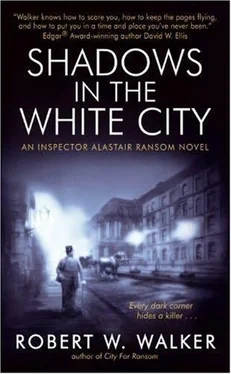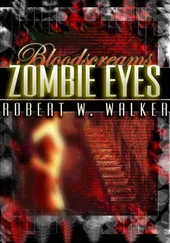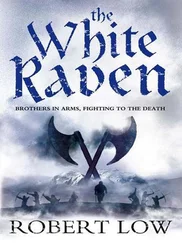Robert Walker - Shadows in the White City
Здесь есть возможность читать онлайн «Robert Walker - Shadows in the White City» весь текст электронной книги совершенно бесплатно (целиком полную версию без сокращений). В некоторых случаях можно слушать аудио, скачать через торрент в формате fb2 и присутствует краткое содержание. Год выпуска: 0101, Издательство: HarperCollins, Жанр: Исторический детектив, на английском языке. Описание произведения, (предисловие) а так же отзывы посетителей доступны на портале библиотеки ЛибКат.
- Название:Shadows in the White City
- Автор:
- Издательство:HarperCollins
- Жанр:
- Год:0101
- ISBN:нет данных
- Рейтинг книги:3 / 5. Голосов: 1
-
Избранное:Добавить в избранное
- Отзывы:
-
Ваша оценка:
- 60
- 1
- 2
- 3
- 4
- 5
Shadows in the White City: краткое содержание, описание и аннотация
Предлагаем к чтению аннотацию, описание, краткое содержание или предисловие (зависит от того, что написал сам автор книги «Shadows in the White City»). Если вы не нашли необходимую информацию о книге — напишите в комментариях, мы постараемся отыскать её.
Shadows in the White City — читать онлайн бесплатно полную книгу (весь текст) целиком
Ниже представлен текст книги, разбитый по страницам. Система сохранения места последней прочитанной страницы, позволяет с удобством читать онлайн бесплатно книгу «Shadows in the White City», без необходимости каждый раз заново искать на чём Вы остановились. Поставьте закладку, и сможете в любой момент перейти на страницу, на которой закончили чтение.
Интервал:
Закладка:
Sara had gone silent as had Sam, and each had been watching the fog-bound family out on the edge of the lake.
Sara, protective of her little hideaway, now asked that they leave by another direction. She had no more to impart.
Alastair saw Samuel slip a few coins to Sara. The boy learns fast, he thought.
Samuel then led Alastair out along the north side of the thicket. In the distance, they could see the masts and lights of private boats owned by Chicago’s elite in Belmont Harbor. Alastair handed Samuel a five-dollar bill, and Sam stared at it as if he’d handed him the key to the city.
“What’s it for? I’ve not found Leather Apron for you.”
“You’ve done your best, and you’ll continue doing your best.”
“Thank you, sir.”
“Are you familiar with Henry Bosch, Sam?”
“Bosch? No. Can’t say as I am, sir.”
“Goes by Dot ’n’ Carry.”
“ Ahhh …yes, everyone knows ’im.”
“He’s, ahhh …well…”
“Says he’s your associate, he does. Is he a copper?”
“Sam, steer clear of Bosch. He sees you as competition. He’ll see payment to you as coming outta his pocket, so be wary of him, all right?”
“Will do, sir.”
They had casually walked back toward the lights of the city when Alastair got the distinct impression they were being watched, followed even, perhaps stalked. He remained calm and sent Samuel off, back in the direction of the city. Seeing that Sam was safely away, Ransom spied a distant cabstand, and he made a show of a leisurely stroll toward it, half expecting some fool to attempt to mug a cop. But nothing happened.
At the carriage, he stopped and scanned the park. Little rustling noises larger than those of squirrels or rats came to his ears. It was almost as if Sara had followed them to see where they might end up, stalking amid the brush. Definitely sounds of small feet scurrying about. Then all went silent. Nothing.
“Something amiss, sir?” asked the coachman, looking out over the park and the lake beyond, as if to see what Alastair could not see.
“No, nothing,” Ransom replied and climbed into the cab, giving the driver his destination-home to Des Plaines. He sat back in the cushions and parted the window sash just as several dirty little animals scurried off northward in the direction Samuel had gone. It was not so much that these homeless looked dirtier and poorer than most that attracted his attention and worried him, but that they moved so low to the ground, like a hunting pack-three in all that he could see, one a female from her more catlike pose. Were they playing at war games? Something in their stealth, something in the way they stopped and started, such wolf packlike crouching and darting of heads, the directing of their eyes, and something he could not put his finger on said these toughs were a nasty bit of a gang bent on robbing Samuel of the money that had changed hands. No doubt, they had seen the transaction.
Alastair’s cane shot up and with the knocking, the driver peered down through the message slot and asked after the disturbance. Alastair said, “Never mind Des Plaines for now. Go slowly northward. I am looking for a boy about eight, maybe nine.”
“Oh, indeed, sir, and will there be a tip in it for me?”
“What? G’damn you, man! The boy is working for me.”
“Yes, sir…I am sure, sir.”
“Pull your mind from the gutter and search for him!”
“’Tis hard seein’ anyone on a night like this, sir.”
“I just left him. He may be in danger!”
The confused cabbie decided he’d best remain silent on the subject. Ransom pushed up the window and scanned for any sign of Samuel, but the boy had disappeared into the night as effectively as had the family of homeless.
It appeared Samuel knew how to make a quick exit and how to take care of himself. Needlessly worrying, Ransom told himself.
The following night
The train yards in Chicago lay out in broad mass across a large portion of the South Levy district, some said like the spinal column of the city. Others called the yards at least as great a blight on the South Lakefront area as the stockyards they fed. But it was money hand over fist, as a thousand trains entered or left the city every day.
Getting a late start, Inspector Alastair Ransom, along with his latest investment, young Samuel, started out for the deepest, darkest depths of the Levy district, moving toward the train tracks, where yet another man had only this morning been killed by a passing freighter. Those who kept records on such accidents informed the press that Joseph Adair, a part Indian, on an early drunk, had not seen the train when he’d driven a mule lorry loaded with Hall’s Bitterroot Cider kegs across the expanse of track; he’d just let one train pass when he slapped his reins and sent himself and the animal into the path of a train going in the opposite direction. Theory had it that he thought the sound of the second train was the echo of the retreating first. It proved a fatal assessment.
Adair represented the sixty-fourth victim of a train in the Chicagoland area this year, and once again the debate to force train companies or municipalities to foot the bill for crossings and alarms raged. But “civic improvements,” railroad tycoons argued were the purview of civic leaders, not railroad barons. They all gave lip service to safety provisions, agreeing to the dangers inherent in speeding trains flying through, but it remained a loggerhead. Just not at our expense…a “local” problem requiring a local tax measure that must be dealt with by each community the railroads served. Meanwhile, the city council considered it an expense that ought to be borne by the railroad companies, which they “allowed” to flourish within their boundaries. Lost in all this were the over six hundred killed in the United States through train mishaps.
Beyond the giant washboard of tracks laid side by side over a hundred yard width, Alastair was joined by Sam. Together they passed into a fenced-off area that meant to keep people out of Chicago’s intricate underground tunnels, blasted out years before. A train ran below ground on one level, but even farther down were tunnels and retired tracks. Samuel led him down and down.
Alastair began to feel like he’d found Dante’s Inferno below the city. The walls here were alive with dampness and reflected light-as torches lined the area. All around them were homeless people huddled in groups, fearful of the well-dressed intruder who obviously did not belong.
“I’d heard rumors the homeless were using the underground, but I had no idea it’d become so widespread.”
“This is nothing,” began Sam. “Since the Vanishings began, a lotta people’ve had enough and they’ve left the tunnels and some have left the city. Gone westward.”
This kid’s got a future, Alastair thought, so long as he doesn’t vanish.
Alastair attempted asking questions of the inhabitants here. Most were living in cardboard boxes, a few lucky ones had wooden crates. One man said to Alastair, “This is my place! This is my crate, and I will fight you to the death for it.”
“I don’t want your crate, sir.”
“Sir?” He laughed. “No one calls me sir. Did you hear that, Mother?” he asked a sleeping woman behind him. The wife only grunted and turned over.
“I am looking for Bloody Mary; have you seen her?”
“Have not.”
“Does she come here?”
“Seldom.”
“When is seldom?”
“Seldom is seldom.”
“Seldom in daylight or seldom at night?”
“I tell you, she has not been round here since…well since the vanishings began, I’d say.”
Читать дальшеИнтервал:
Закладка:
Похожие книги на «Shadows in the White City»
Представляем Вашему вниманию похожие книги на «Shadows in the White City» списком для выбора. Мы отобрали схожую по названию и смыслу литературу в надежде предоставить читателям больше вариантов отыскать новые, интересные, ещё непрочитанные произведения.
Обсуждение, отзывы о книге «Shadows in the White City» и просто собственные мнения читателей. Оставьте ваши комментарии, напишите, что Вы думаете о произведении, его смысле или главных героях. Укажите что конкретно понравилось, а что нет, и почему Вы так считаете.











